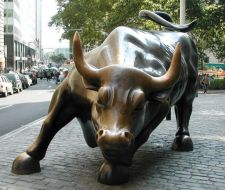 A largely new but quite controversial field of research tries to link the private life of CEOs to the performance of their company. CEOs are often seen as critical to the business they lead and therefore some investors want to learn as much as possible about the man behind the wheel in order to optimize their investing decisions.
A largely new but quite controversial field of research tries to link the private life of CEOs to the performance of their company. CEOs are often seen as critical to the business they lead and therefore some investors want to learn as much as possible about the man behind the wheel in order to optimize their investing decisions.
While this kind of information might be in the best interest of the shareholders of a company it’s quite controversial as it invades the privacy of executives.
“When you go to the track, you study the horse,” says David Yermack, a New York University finance professor. “Investing is not that different. You want to know as much as you can about the jockey.”
However, others claim this kind of research should be taken with a grain of salt as no causal tie is proved.
The reason I’m reporting this is because Wall Street Journal recently published an article about a report from three Danish finance professors who investigated 75,000 Danish firms. The researchers found that the loss of a relative can have a big impact on the performance of the CEO’s company. And while this kind of research is quite intrusive the results are quite interesting.
Here’s a look at what happens to the company’s operating return in the two years after the loss of a relative, versus the two years before:
- Child: -21.4%
- Spouse: -14.7%
- Any family member: -9.4%
- Parent: -7.7%
Now the funny thing is that in one specific case the company’s profit actually goes up. The researchers claim that when the mother-in-law of a CEO dies, the company’s performance goes up by an average of 7 percent. However, the researchers say the number is too small to be statistically significant, but it is quite funny as it confirms the age-old cliché.
The greatest change followed a death of a CEO’s child. On average, profitability, as measured by operating return on assets, was roughly 21% lower in the two years after such an event than in the two years before it. The drop was sharper when the child was under 18, and greater still if it was the death of an only child.
…
In the study, a CEO’s parent’s death also was followed by a decline in the company’s return on assets, though a smaller drop than after the death of a spouse or child. Overall, the profitability drops were sharper at companies headed by female CEOs. The researchers say they’re not clear why.
…
Only a mother-in-law’s death was correlated with an upturn, and it was too small to be statistically significant. Prof. Wolfenzon says they included the mother-in-law as a rationality check.
The journal also talks about another study from finance professor David Yermack and Crocker Liu which links executives’ home purchases to the stock results of their company. It seems that on average, the stocks of companies run by leaders who buy or build very large mansions sharply underperform the market while companies of chiefs who bought or built more modest houses outperform the market.
Prof. Yermack and Crocker Liu of Arizona State University set out to find real-estate records on the CEOs who were running all of the S&P 500 companies at the end of 2004. They scoured electronic records of taxes and deed transfers. When they couldn’t find a home address, they turned to databases on voter registration rolls and campaign contributions. Eventually they found the addresses of 488 of the 500 executives.
The median size of their principal homes was a little over 5,600 square feet. Some were far bigger. A key finding was that stock performance tended to deteriorate after a CEO bought or built an extremely large or costly estate, which they defined as over 10,000 square feet or sited on more than 10 acres. On average, these companies’ stocks underperformed the S&P 500 index by about 25 percentage points over the three years after the purchase.
They aren’t sure why but theorize that some of these executives might be focusing less on working hard and more on enjoying their wealth, and that therefore the performance of their company drops.